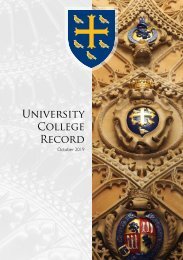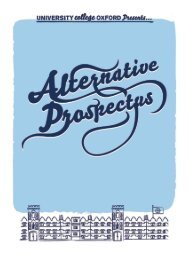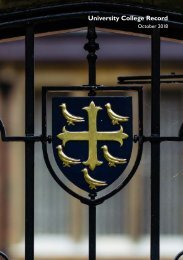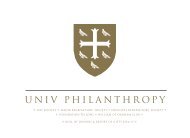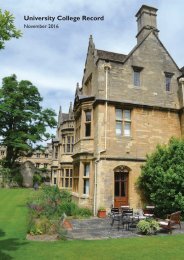Create successful ePaper yourself
Turn your PDF publications into a flip-book with our unique Google optimized e-Paper software.
nuns at his primary school who had given him the initial encouragement in his studies.<br />
In 1941 he went on to study Classics at Canterbury <strong>Univ</strong>ersity College, taking a First<br />
followed by postgraduate degrees. In 1947, he was appointed Junior Lecturer in Classics<br />
at the <strong>Univ</strong>ersity of Otago, and a career as a Classicist beckoned.<br />
However, in the same year he was awarded a <strong>Univ</strong>ersity of New Zealand Postgraduate<br />
Travelling Scholarship in Arts, as a result of which he came to Oxford. Frank chose<br />
to matriculate, not in Classics, but in Modern Languages, focussing on French and<br />
German, a language he had entirely taught himself. Nevertheless he won the Heath<br />
Harrison Prizes for French in 1949 and for German in 1950.<br />
On taking his First in 1951, Frank was appointed Lecturer in Modern Languages at<br />
<strong>Univ</strong>., but then in 1952, was elected to a Fellowship at Trinity College to become their<br />
first Fellow in Modern Languages. During his first year at Trinity, he continued to teach<br />
his <strong>Univ</strong> pupils until his successor was appointed.<br />
Frank was fluent in at least five modern European languages. He specialised in<br />
teaching French literature, language and philology as a Tutorial Fellow and <strong>Univ</strong>ersity<br />
Lecturer, but also taught other languages from time to time. He researched and published<br />
in particular on Late Latin and the early history of the French language. However, he also<br />
took an especial interest in Romania, because of the Romance origins of its languages,<br />
visiting the country regularly in the 1960s, and lectured on Romanian in Oxford.<br />
Frank widened his knowledge of languages and put it to use in the fostering of<br />
international understanding, to which he attached the greatest importance, through his<br />
translation work for the United Nations. He also did editorial work for the International<br />
Labour Review.<br />
On his retirement from Trinity in 1986, Frank and his wife, Elizabeth, returned to<br />
his native New Zealand to live in the house into which he had been born, although they<br />
regularly returned to Oxford and their holiday home in Spain. He died peacefully in<br />
Christchurch. [We are very grateful to Elizabeth for her help in preparing this tribute].<br />
SIR JOHN ANTHONY SWIRE died on 28 November 2016. See Honorary Fellows<br />
above.<br />
DAVID WILLIAMSON TANNER (Raynes Park County School) died on 28 November<br />
2016 shortly before his 86th birthday. David read Chemistry at <strong>Univ</strong>, both as an<br />
undergraduate and a postgraduate. Having spent two years postgraduate research at<br />
the <strong>Univ</strong>ersity of Minnesota, he came back to Britain to work first for the Department<br />
of Scientific and Industrial Research from 1957-64, and then for the Department of<br />
Education and Science, where he rose to become Head of the Science Branch from 1981<br />
until his retirement in 1989. He leaves a widow, Glenis, a son and two daughters.<br />
David’s son Jo has kindly allowed us to include these extracts from the eulogy he<br />
delivered at his father’s funeral:<br />
‘“Stand up, speak up, shut up’. David was never far away from a pithy aphorism.<br />
He had the most remarkable brain. And with it came a remarkable sense of humour. I<br />
remember when we were bicycling in Budapest the wrong way down a road. ‘Vun way!<br />
Vun way!’ a man shouted at us. ‘We’re only going one way’ David said to me with a smile.<br />
“He loved books. No he didn’t. He really, really, loved books. By the time I was about<br />
5 or 6 I accepted that I would always get them as presents – the flares and football boots<br />
were left to my mother to buy. It’s the way he was. But as a result he was the first boy to<br />
get a scholarship to Oxford from Raynes Park County School. They were so proud of him<br />
they immediately instigated an annual day off for everyone, in his honour.<br />
“David was not ambitious. He was gentle, studious, intellectual. He was artistic and<br />
sensitive, cultured and non-confrontational. And although he worked for Mrs Thatcher,<br />
he distanced himself the moment she revealed her politics.<br />
“He took us to galleries, theatre and exhibitions, always with the aim of opening our<br />
eyes and our hearts. The 1970 Pop Art exhibition at the Tate changed my life. And we<br />
never went to a city or town without visiting its churches or cathedral. He loved them for<br />
their beauty and tranquillity.<br />
“Another great love of his was philosophy. Aged 65 he decided to study it part<br />
time. Within weeks his tutors had a departmental meeting about him because they<br />
were struggling to have a life beyond marking his extraordinarily long and analytical<br />
essays. They asked him if he wouldn’t kindly mind reducing them a little … possibly?<br />
He obliged. And in return they obliged him with a Starred First – the first in 15 years.<br />
“David was more than our father, he was our friend. And this makes his departure<br />
and our loss doubly heartfelt.”<br />
1949<br />
COLIN EDWARD GEORGE (Caterham) died on 15 October 2016 aged 87. He read<br />
English at <strong>Univ</strong>, but like many of Peter Bayley’s pupils was drawn to the theatre,<br />
becoming a member of OUDS. On graduating he formed the Oxford and Cambridge<br />
Players (later the Elizabeth Theatre Company). Their production of Henry V, in which he<br />
took the title role, was televised. In the late 1950s, Colin moved from acting to directing,<br />
and in 1958 was appointed associated director of Nottingham Playhouse. In 1965 Colin<br />
became artistic director of the Sheffield Playhouse, where he introduced audiences to<br />
modern playwrights such as Bertholt Brecht, John Osborne and Harold Pinter.<br />
Shortly after taking up this post, he was given funding to design a new theatre, and<br />
persuaded by the director Tyrone Guthrie to visit Stratford, Ontario, and Minneapolis,<br />
encountered for the first time three-sided thrust stages, which brought the actors into<br />
the middle of the audience. He successfully persuaded the Sheffield authorities to create<br />
this effect for their theatre, and although at the time some councillors and theatre<br />
directors were bitterly opposed to the innovation, the new Crucible Theatre was opened<br />
in November 1971, and soon proved a great success, not least as the venue for the World<br />
Snooker Championships.<br />
In 1974 Colin left Sheffield to work first for the State Theatre Company of South<br />
Australia, where he gave Mel Gibson his first major stage role, and then for Hong Kong<br />
Academy for Performing Arts. In Hong Kong he took a Chinese production of The<br />
Bacchae to Beijing and Shanghai. On his return to Britain he joined the Royal Shakespeare<br />
Company in 1994. He also devised a one-man-show in the person of Shakespeare’s father.<br />
His last stage role was that of Desdemona’s father in Othello, performed appropriately<br />
enough at the Crucible in 2011, in a production marking that theatre’s 40th anniversary.<br />
He is survived by his second wife, four children, and 14 grandchildren.<br />
62<br />
63





